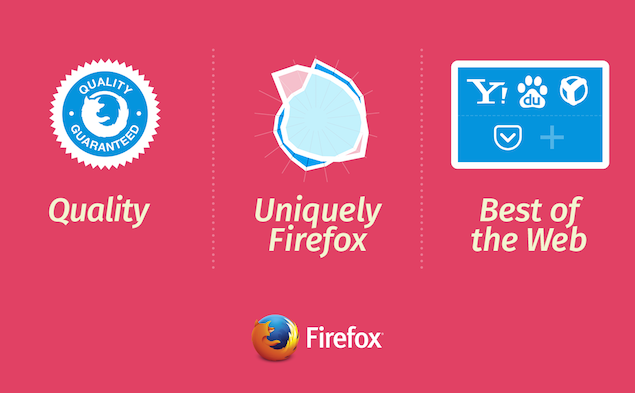- Home
- Internet
- Internet News
- Mozilla Details Plans for Firefox, From Web Technology to Partnerships
Mozilla Details Plans for Firefox, From Web Technology to Partnerships

In what could be seen as a potential game changing decision for Mozilla and its flagship browser Firefox, the company is on a path to completely revamp the design and make fundamental changes to the build. On Sunday, Dave Camp, Firefox's director of engineering, sent out two emails to his developers with details on what Firefox intends to achieve in the future.
The emails are a follow-up to a blog post published last week, which detailed the non-profit's focus on three pillars going forward - Quality, Uniquely Firefox, and Best of the Web. Camp elaborated on these focus points in his email. For quality, the biggest point mentioned was the reorganisation of the new feature development cycle to ensure that existing features are up to the mark. If engineers cannot fix faulty features, they should either remove it completely, or use a third-party service to do the job instead.
In one of the emails Mozilla hinted that it wants to lean on to its add-on community and partners for browser features that can't be built in-house. By doing this Mozilla actually addressed one of the main concerns of its community in recent times that Pocket should have been included in Firefox as a bundled add-on and not as a deep-rooted integration into Firefox. The team now adds it is a priority project for it to give users a simpler way to remove the Pocket integration, and that it would follow such a model for future integrations - giving users complete choice.
Firefox is built on top of its proprietary XML User Interface Language (XUL) and XML Binding Language (XBL), which were born out of a need to plug that gaps that HTML had according to Mozilla. Mozilla intends to drop this language primarily because (and according to Camp's email) XUL isn't a web technology like HTML and as a result performance problems are left unfixed. This also creates complexity for Firefox's proprietary rendering engine Gecko. Mozilla hasn't revealed what tech it intends to use in the future to replace XUL and XBL.
One of the new features in the future will be Electrolysis, the project that aims to bring multi-process support to Firefox. Mozilla has been working on it since 2013. Mozilla is also aiming to improve the security and performance of add-ons by building a better API. Going forward, Mozilla also hope to reduce the time taken to deliver a new version of Firefox, down from 18 weeks for development model which sees a new iteration every six weeks. "We think there are big wins to be had in shortening the time that new features reach users. Critical fixes should ship to users in minutes, not days," Camp says.
The Mozilla team was also revealed to be working on an improved version of Private Browsing, as well as changes to the User Agent for better Web compatibility and customisation.
Catch the latest from the Consumer Electronics Show on Gadgets 360, at our CES 2026 hub.
Related Stories
- Samsung Galaxy Unpacked 2025
- ChatGPT
- Redmi Note 14 Pro+
- iPhone 16
- Apple Vision Pro
- Oneplus 12
- OnePlus Nord CE 3 Lite 5G
- iPhone 13
- Xiaomi 14 Pro
- Oppo Find N3
- Tecno Spark Go (2023)
- Realme V30
- Best Phones Under 25000
- Samsung Galaxy S24 Series
- Cryptocurrency
- iQoo 12
- Samsung Galaxy S24 Ultra
- Giottus
- Samsung Galaxy Z Flip 5
- Apple 'Scary Fast'
- Housefull 5
- GoPro Hero 12 Black Review
- Invincible Season 2
- JioGlass
- HD Ready TV
- Laptop Under 50000
- Smartwatch Under 10000
- Latest Mobile Phones
- Compare Phones
- Honor Magic 8 RSR Porsche Design
- Honor Magic 8 Pro Air
- Infinix Note Edge
- Lava Blaze Duo 3
- Tecno Spark Go 3
- iQOO Z11 Turbo
- OPPO A6c
- Samsung Galaxy A07 5G
- Lenovo Yoga Slim 7x (2025)
- Lenovo Yoga Slim 7a
- Lenovo Idea Tab Plus
- Realme Pad 3
- Moto Watch
- Garmin Quatix 8 Pro
- Haier H5E Series
- Acerpure Nitro Z Series 100-inch QLED TV
- Asus ROG Ally
- Nintendo Switch Lite
- Haier 1.6 Ton 5 Star Inverter Split AC (HSU19G-MZAID5BN-INV)
- Haier 1.6 Ton 5 Star Inverter Split AC (HSU19G-MZAIM5BN-INV)







![[Sponsored] Haier C90 OLED TV | Dolby Vision IQ, 144Hz OLED and Google TV in Action](https://www.gadgets360.com/static/mobile/images/spacer.png)









